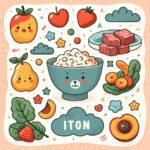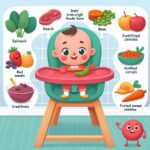Identifying Iron-Rich Foods for 12-Months-Old Anemic Infants is crucial for their development and health. Anemia, a common condition in infants, especially around the age of 12 months, can significantly impact their growth and immune system. This guide offers an in-depth look at the best iron-rich foods to incorporate into your 12-month-old’s diet to combat anemia effectively.
Anemia in infants often arises due to a lack of iron in their diet. Since iron is a key component in hemoglobin, which carries oxygen in the blood, its deficiency can lead to various health issues. For parents, understanding which foods can help meet their infant’s iron needs is essential.
Understanding Anemia in Infants
Anemia in infants can manifest through symptoms such as fatigue, pale skin, and a decreased appetite. It’s important for parents to recognize these signs early and consult with a healthcare provider for a proper diagnosis and treatment plan.
In most cases, incorporating iron-rich foods into the diet can help resolve anemia. The American Academy of Pediatrics recommends that infants and toddlers have an adequate intake of iron-rich foods to prevent anemia and its associated risks. American Academy of Pediatrics
Iron-Rich Foods for 12-Months-Old Anemic Infants
For 12-months-old infants, transitioning to solid foods presents an opportunity to introduce a variety of iron-rich options. Here are some top recommendations:
- Fortified cereals: A simple yet effective way to boost iron intake.
- Lean meats: Beef and chicken are excellent sources of heme iron, which is easily absorbed by the body.
- Legumes: Beans, lentils, and chickpeas are not only rich in iron but also provide fiber and protein.
- Green leafy vegetables: Spinach and kale are packed with iron and can be pureed for easy consumption.
- Fruits: Prunes, raisins, and apricots contribute to iron intake and add natural sweetness to meals.
Incorporating these foods into your infant’s diet can help combat anemia and support their overall health. For detailed meal ideas and recipes, visit our comprehensive guide on iron-rich foods for 12-months-old anemic infants.
Supplementing Iron in Your Infant’s Diet
While dietary sources are the best way to increase iron levels, some infants may require supplements. This decision should be made in consultation with a healthcare provider, who can recommend the appropriate dosage based on the infant’s specific needs.
Remember, iron supplements should be used cautiously, as excessive iron can lead to constipation and other gastrointestinal issues. A balanced approach, focusing on both dietary sources and, if necessary, supplements, is key to managing anemia in infants.
Creating a Balanced Diet for Anemic Infants
Creating a balanced diet for your 12-months-old anemic infant goes beyond just adding iron-rich foods. It’s about ensuring a variety of nutrients that support overall growth and development.
A balanced diet includes a mix of fruits, vegetables, grains, and protein sources. It’s also important to incorporate foods rich in vitamin C, as it enhances iron absorption. For infants with dietary restrictions or allergies, consulting a nutritionist or pediatrician can provide tailored advice to meet their nutritional needs.
For more information on creating a balanced diet for your infant, explore our resources on transitioning from breast milk to cow’s milk at 12 months, combating iron deficiency without meat in a toddler’s diet, and nutritional needs for premature babies. Each guide offers valuable insights and practical tips to support your infant’s health and development.
Addressing anemia in 12-months-old infants requires a proactive approach, focusing on dietary changes and, if necessary, supplements. By incorporating iron-rich foods and ensuring a balanced diet, you can support your infant’s health and development during this critical stage. Always consult with a healthcare provider for personalized advice and recommendations.













